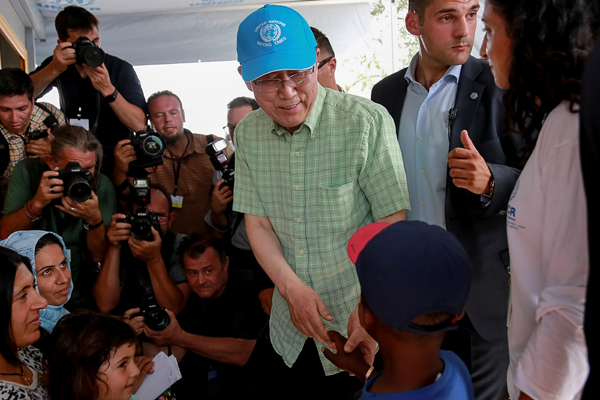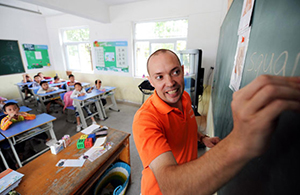Why China should play a bigger role in refugee crisis
By Yan Shaohua (chinadaily.com.cn) Updated: 2016-07-22 11:30
|
|
|
UN Secretary-General Ban Ki-moon (C) greets a child during his visit at the municipality-run refugee camp of Kara Tepe on the island of Lesbos, Greece, June 18, 2016.[Photo/VCG] |
The ongoing refugee crisis and migration issue was at the heart of last month’s historic ‘Brexit’ vote, and will continue to be one of the biggest challenges for European countries and societies in the upcoming years. While the EU and its member states are at the forefront of dealing with this overwhelming crisis, the issue also has an international dimension where the international community, including China, has a stake and thus need to tackle this challenge together.
At the recent EU-China Summit concluded on 13th of July, China agreed to tackle the migration crisis at the global level which is different from one year ago. This is undoubtedly a sensible gesture as China does have an important stake in the European refugee crisis.
In the first place, China is not immune to refugee crisis. Historically China received Jewish refugees during the WWII. Nowadays China’s neighborhood is still prone to potential conflicts or destabilization, in particular in the Korea Peninsula, Afghanistan, Myanmar, and Central Asia. Engaging appropriately in refugee governance will provide China valuable experience and expertise needed once such a scenario rises at its door.
The refugee crisis also provides an opportunity for China to substantiate the strategic partnership with the EU. Based on the EU-China cooperation on anti-piracy in the Gulf of Aden and Iran nuclear issue, the refugee crisis might be a bigger step forward for building trust and strategic partnership considering the far-reaching impact and comprehensive approaches at all-side levels.
From a humanitarian perspective, contribution to the refugee issue would foster China’s image as a bigger responsible player in the international community.
Undoubtedly, there are cultural differences and societal obstacles behind China’s attitude towards the current refugee crisis. But China should play a bigger role on this issue as it’s expected to contribute more to global governance in accordance with its position.
A first option would be to engage more proactively with the international regime governing the refugee and migration issues, including the UNHCR, ICRC, and the International Organization for Migration (IOM) etc. In fact, China has recently made a positive move to formally apply for membership in the IOM, a signal of China’s intention to play a bigger role in this field.
The upcoming G20 Summit in Hangzhou this September serves as another important platform for China to discuss the issue with other stakeholders. If progress could be made on solving this pressing global issue, it would be a great achievement for China as a host of G20 for the first time.
Yan Shaohua, PhD candidate of European Studies at the University of Hong Kong.













